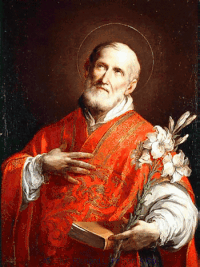
Back فيليب نيرى ARZ Filippo Neri Breton Felip Neri Catalan Filip Neri Czech Filippo Neri Danish Philipp Neri German Filipo Neri Esperanto Felipe Neri Spanish Filipe Neri Basque Philip Neri Finnish
Philip Neri | |
|---|---|
 | |
| Born | 22 July 1515 Florence, Republic of Florence |
| Died | 26 May 1595 (aged 79) Rome, Papal States |
| Venerated in | Catholic Church Church of England |
| Beatified | 11 May 1615 by Pope Paul V |
| Canonized | 12 March 1622 by Pope Gregory XV |
| Feast | 26 May |
| Patronage | Rome, Italy; Candida, Italy; Mandaluyong, Philippines; US Special Forces; Institute of Christ the King Sovereign Priest; Catbalogan, Philippines; laughter; joy; comedians; artists; writers |
Philip Romolo Neri CO (/ˈnɪəri/ NEER-ee; Italian: Filippo Romolo Neri, pronounced [fiˈlippo ˈrɔːmolo ˈneːri]; 22 July 1515 – 26 May 1595), sometimes referred to as the Second Apostle of Rome after Saint Peter, was an Italian Catholic priest who founded founder of the Congregation of the Oratory, a society of secular clergy dedicated to pastoral care and charitable work. Neri's spiritual mission emphasized personal holiness and direct service to others, particularly through the education of young people and care for the poor and sick. His work played a significant role in the Counter-Reformation, especially within the city of Rome.
Neri's early life in Florence and later move to Rome in 1533 marked the beginning of his dedication to missionary work. He initially gained prominence for his pastoral care and efforts to minister to marginalized communities, including prostitutes and the destitute. His passion for reform and personal holiness drew many followers, leading to the formation of the Church of the Most Holy Trinity of the Pilgrims and the Congregation of the Oratory. The Oratory became a center of spiritual renewal and pastoral innovation, focusing on prayer, music, and informal spiritual gatherings that combined religious instruction with personal reflection.
As a spiritual leader, Neri was noted for his humility, humor, piety, and ability to inspire deep devotion among both clergy and laypeople. His friendship with figures such as Ignatius of Loyola and influence over the Society of Jesus played a role in the broader movement of Church reform. Neri also engaged in limited political activity, most notably when he intervened to secure the reconciliation of Henry IV of France with the Church.
Canonized in 1622, Philip Neri remains a significant figure in Catholic tradition. His feast day is celebrated on 26 May, and he is venerated for his contributions to personal spirituality and the Catholic Church. His legacy is associated with the Seven Churches Walk, a pilgrimage he initiated, and his promotion of musical forms such as the "laude" and oratorios, which had lasting impacts on sacred music.